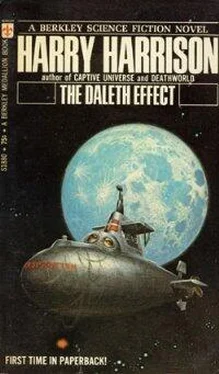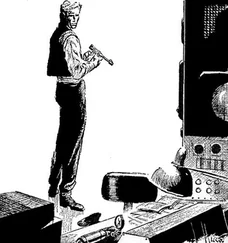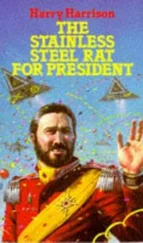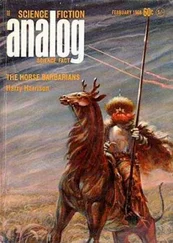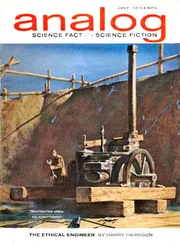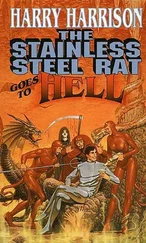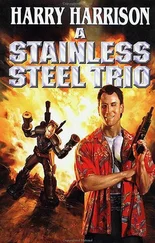Gev was already running toward the exit to the passenger section of the ship. “It’s locked,” he shouted back. “Is there any way we can reinforce this door?”
The others led by Nils, were close behind him. They were just in time to stare, aghast, at the television monitor. A group of men, five, ten, came into sight around the bend in the corridor outside, racing toward the door. Baxter was in front and behind him ran one of the Formosa delegates, some South Americans, a Vietnamese. One of them raised a broken-off chair leg and swung at the camera. It went blank.
“This is going to be difficult,” Gev said calmly, looking at the door. “We are going to have to fight on two fronts—and we are not even equipped for combat on one.”
“Captain,” the radio operator called from the bridge. “Engine room reports that the cutting has started again.”
There was a deep boom of an explosion, ear-hurting loud in the confined corridor, and the door bulged toward them, twisted and a great cloud of smoke boiled in. They were stunned, knocked down. Then the door shivered and moved further inward, and a man holding a makeshift gun began to squeeze through.
Gev sprang, hands out. Grabbing the man’s wrist, twisting it so the gun pointed to the ceiling. It fired once, an almost soundless splat to their numbed ears. Then Gev chopped down with the edge of his free hand, breaking the man’s neck. He fumbled an instant with the unusual mechanism of the gun, then poked it through the opening over the dead man’s back and fired until it was empty.
This only delayed the attackers a moment. Then the door was pushed wider and two men climbed in, treading on the corpse. Nils hit one in the face with his fist, knocking him back through the opening with its force.
But they were outnumbered—and outgunned. Yet they gave a very good accounting of themselves. General Gev did not drop until he was hit with at least three bullets. They did not shoot Nils, but men hung from him, holding down his arms, while another clubbed him into submission. Arnie knew nothing about fighting, though he tried with very little success. Dead and wounded were left behind when they were dragged back to the bridge.The radio operator, the only crewman remaining there, was talking on the radio.
“Shut up.” Baxter shouted at him, raising his gun. “Who are you talking to?”
The operator, white-faced, clutched the microphone. “It is our Moon base. They have relayed the call to Copenhagen. I told them what was happening here. The others have broken into the engine room, taken it.”
Baxter thought for a long moment, then lowered the gun and smiled. “You’ve done all right. Continue your report. Tell them that you have received assistance. The Commies are not getting away with this. Now—how do I get in touch with the engine room?”
The radio operator pointed silendy at the telephone screen, where an impassive face looked out. Baxter was just as unemotional as he strode over to the phone.
“You’re a traitor, Schmidt,” he said. “I knew that as soon as I saw you were a member of the East German delegation. That was not very wise of you.” Baxter turned to Nils who had been placed in a chair. He was struggling back to consciousness. “I know this man, Captain. A paid informer. It’s a good thing for you that I am here.”
General Gev slumped on the floor against the wall, listening silently, apparently unaware of his blood-soaked, dripping leg. His right arm had been hit by a bullet as well, and he had his hand pushed into the open front of his shirt. Arnie’s glasses were broken, gone, and he blinked myopically, trying to understand what was happening.
Baxter looked distastefully at Schmidt’s image. “I don’t enjoy dealing with traitors…”
“We all have to make small sacrifices.” Schmidt’s words were heavy with irony. Baxter flushed with anger but went on, ignoring them.
“There seems to be a stalemate here. We hold the bridge and the controls.”
“While I and my men are in charge of the engines and the drive unit. My forces are not as strong as they should be—but we are well armed. I think that you will find it impossible to defeat us. You will not get us out of here. So what do you intend to do, Mr. Baxter?”
“Is Dr. Nikitin with you?”
“Of course! Why else do you think we are here?” Baxter broke the connection and turned to Nils. “This is very bad, Captain.”
“WTiat are you talking about?” The fog was clearing somewhat from Nils’s battered head. “Who is this Nikitin?”
“One of their better physicists,” Arnie said. “With the diagrams and circuitry he should know the basic principles of the Daleth drive by now.”
“Exactly,” Baxter said and put his gun away. “They hold the engine room, but cannot take the bridge, so all is not lost. Report that to your superiors,” he ordered the radio operator. “It is a stalemate for the moment—but if we had not been here they would have taken the entire ship. You see, Captain, you were mistaken about us.”
“Where~did you get the guns?” Nils asked. “That explosive?”
“Of what importance is that? Gun barrels looking like fountain pens, swallowed ammunition, plastic explosive in toothpaste tubes. The usual thing. It’s not important.”
“It is to me,” Nils said, sitting up straighter. “And what do you propose to do now, Mr. Baxter?”
“Hard to say. Bandage you people up first. Try to arrange a deal with that double-agent Kraut. We’ll work something out. Have to turn back, I guess. Prevent any more killing. They know about the drive now, so the cat is out of the bag. No secrets left between allies, hey? Your people in Copenhagen will understand. I imagine America will handle it through NATO, but that’s not my area of responsibility. I’m just the man in the field. But you can be sure of one thing.” He drew himself up. “There is going to be no Daleth gap. The Russians are not going to get ahead of us with this one.”
Nils rose slowly, painfully, and stumbled to his chair at the controls. “Who are you talking to?” he asked the radio operator.
“There is a patch to Copenhagen. One of the Minister’s assistants. It is the middle of the night there and the others were asleep when I called. The King, the Prime Minister, they’re on the way.”
“I’m afraid we can’t wait for them.” They spoke English so Baxter could understand. Nils now turned to him. “I would like to explain what has happened.”
“By all means, sure. They’ll want to know.”
Still in English, slowly and carefully, Nils outlined the recent occurrences. After a long delay, while the signal reached out to Earth and the answer came back, the man at the other end spoke in Danish, and Nils answered in the same language. When he had finished, there was a tense silence on the bridge.
“Well?” Baxter asked. “What was that about? What did they say?”
“They agreed with me,” Nils told him. “The situation is hopeless.”
“Good thinking.”
“We agreed on what must be done. He thanked us.”
“What the hell are you talking about?”
Nils was finished with patience and formality now. He spat the words with a slow anger that had finally burned through.
“I’m talking about stopping you, little man. Violence, death, killing—that is all you know. I don’t see an ounce of difference between you and your paid creatures here, and that swine now in charge of the engine room. In the name of good you do evil. For national pride you would destroy mankind. When will you admit that all men are brothers—and then find some way to stop killing your brothers? Your country alone has enough atomic bombs to blow up the world four times over. So why must you add the additional destruction of the Daleth effect?”
Читать дальше
